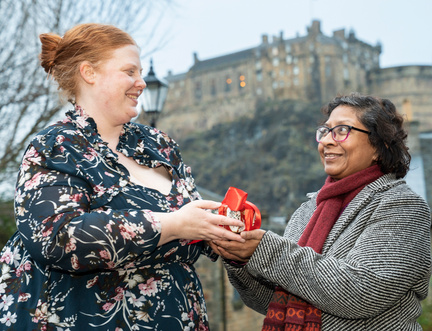More articles Sunday 14 August 2016 5:00pm
Theatre of War Connects Ancient & Modern Trauma

Theatre of War brought a unique hybrid form to the stage of the Book Festival tonight: a performance of classical Greek tragedy which also comprises the sharing of intimate personal stories from the stage and unsparing questions asked of the audience. American director Bryan Doerries has taken this project all over the world, largely to military bases – Edinburgh witnessed its 351st outing. Worldwide, Doerries can now call on a company of some 200 actors, for what he calls “an innovative public health campaign”.
The combination of performance and discussion illuminates the timelessness of certain aspects of warfare – predominantly the trauma it leaves behind, and the “invisible wound” of post-traumatic stress disorder. The problem of dealing with the psychological aftermath of war is, Doerries emphasises, one that we all share – but one that raises many difficult questions. “How do we honour the sacrifice,” he asked, “without honouring the violence?”
American actors Heather Goldenhersh and Brian O’Byrne were joined by Scottish stage star Richard Conlon to perform two hard-hitting extracts from Sophocles’ Ajax, one of the themes of which is the main character’s emotional derangement in response to what he has experienced on the battlefield and the impact it has upon the mother of his child, Tecmessa.
The performance was followed by a panel discussion, in which Ajax and Tecmessa found contemporary incarnations in the form of Scottish couple Vince and Fiona Davidson, who have been living with Vince’s PTSD for twenty-five years. The couple were joined by Matthew Green, author of Aftershock: The Untold Story of Surviving Peace, and Chris Muldoon, a guide dog trainer who has spearheaded projects to supply veterans with assistance dogs. Themes raised by Sophocles, Muldoon said, remain at the forefront of PTSD sufferers’ problems: the sense of having let down one’s friends; the loss of a community; the fracturing of family dynamics. “Soldiers don’t change,” he said. “The same issues face the soldiers that we have now.”
Yet even identifying sufferers in order to help them is a challenge in itself, Green observed, since such a powerful sense of shame attends the condition. “It’s changing - there are a lot of voices coming online; the NHS is trying to do a better job; military charities are stepping up. But one of the hardest things is finding people. We can all be a part of that.” Davidson, who for many years avoided that numerous triggers to his own trauma by living apart from his family in the shed, confirmed that he had made tremendous gains simply by making contact with his fellow veterans – an opportunity presented by Facebook. “By getting together and talking to each other, we can open up and not be judged,” he said.
A rich theatrical experience shifted to another level of pertinence and intimacy by what Doerries called the “radical candour” of its participants, Theatre of War was an out-of-the-ordinary Festival event – and presents a thrilling model for the practical application of the arts to everyday life and community.
- 2025 Festival:
- 9-24 August
Latest News
 Communities Programme participants celebrate success of 2024
Communities Programme participants celebrate success of 2024



